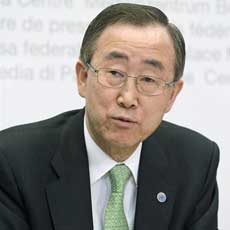UN chief hopes Greece's will address its poor migrant asylum record
 Athens - UN Secretary General Ban Ki-moon expressed hope on Wednesday that Greece will address its poor migrant asylum record in accordance with human rights laws.
Athens - UN Secretary General Ban Ki-moon expressed hope on Wednesday that Greece will address its poor migrant asylum record in accordance with human rights laws.
"I know that all states, including Greece have the right to determine the stay of migrants but I sincerely hope that this will be addressed with the settlement of human rights and laws," Ban said during 3rd Global Forum on Migration and Development.
"As the host organizer, Greece may have the moral and political responsibility in seeking a settlement of the issues," Ban told journalists.
Sitting at the crossroads of three continents - Europe, Africa and Asia - Greece has become the main transit point for immigrants seeking entry into the European Union. The number of illegal immigrants arriving in the country has surged over the past year.
The Hellenic Migration Policy Institute estimates that 120,000 will be picked up after having covertly entering Greece in 2008, a 500 per cent increase on 2003.
While thousands of new arrivals attempt to stow away aboard a ferry bound for Italy, believing they have better chances of asylum, the majority end up heading to Greece's main cities in search of work.
The Dublin Convention requires migrants to claim asylum in the first EU country they enter, which for may is Greece.
Refugee advocates and human rights groups, such as New-York-based Human Rights Watch, have slammed Greece for its treatment of migrants, accusing the country of illegally deporting migrants and often misleading them about their right to apply for asylum.
Last year fewer than 1 per cent of the 25,000 people who applied for asylum from the Greek government were successful, far below rates of 18 per cent in Germany, 11 per cent in Italy and 4 per cent in Spain.
"If you care to look, delegates to the Global Forum might notice unaccompanied child migrants outside the conference hall," Human Rights Watch director Bill Frelick in a statement.
Greek Prime Minister George Papandreou said immediate measures would be taken to revise the residence permit system and give second generation migrants access to citizenship.
Addressing hundreds of delegates at the start of the two-day conference, the UN secretary general said the number of international migrants is greater than at anytime in history, with 214 million people living outside their country of birth.
Ban highlighted three global challenges that needed urgent action in managing migration - namely dealing with the economic crisis, climate change and human trafficking.
He said the recent global recession has highlighted the vulnerability of migrants, as many often lack safety nets and cannot afford to return home.
"The crisis has also soured public perceptions of migrants - they become easy scapegoats for job losses or lower wages," said Ban.
On the issue of climate change, the secretary-general said expanding desertification in Africa and perennial flooding in Asia is affecting migratory patterns, thus forcing more people to leave rural areas.
Ban said special attention should be also paid to the most vulnerable migrants of all - victims of human trafficking, especially women and girls.
"Traffickers deny victims their fundamental rights, including freedom of movement and freedom from abuse as well as access to health, education and decent work." (dpa)